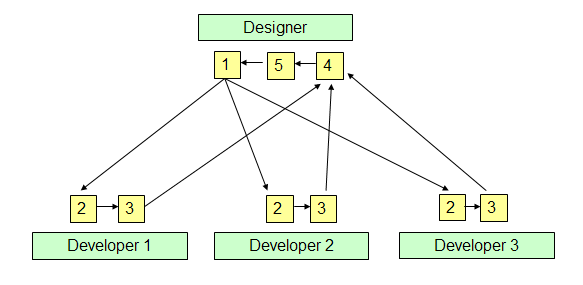

This type of scenario is suitable for projects that have a single designer utilizing multiple developers to implement the application:

| Step | Description |
|
1 |
The designer creates a prototype Framework defining all required applications, views, business objects, filters and command handlers for this development cycle. A copy of the Framework definition XML file is given to developers 1 -> 3. |
|
2 |
Developers 1 through 3 now code, compile and test the various filters and command handlers assigned to them by the designer. To do this they need to snap them into the Framework definition. Note that the developers are not creating new Framework objects. They are modifying the definitions of existing objects only. |
|
3 |
As developers 1 -> 3 complete the filter and command handler work assigned to them they use the Merge Tool to create a merge list containing the filters and command handlers they have altered. The merge lists are e-mailed back to the designer. |
|
4 |
The designer receives the merge lists and merges the changed filter and command handler definitions into the master Framework version. |
|
5 |
Each developer is given a fresh copy of the master Framework definition which contains their completed work and the completed work of the other developers. This new copy of the master Framework becomes the base on which they will do further work. |
This type of development cycle is repeated until all filters and command handlers have been completed. The master Framework is gradually evolved from a prototype into a completed application ready for deployment.